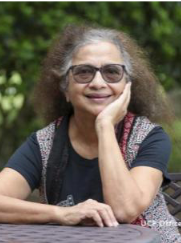In the pursuit of a sustainable future, the last decade has seen a concerted effort in accelerating the discovery of materials for energy needs. In this talk I will focus on few 2D materials that provide the playground for understanding and manipulating their chemical and physical properties to harness novel functionalities. I will show how defects in single-layer hexagonal boron nitride (h-BN) transform the local electronic structure such that it captures and converts CO2 to value added products [1]. While defects also play a role in controlling the optoelectronic properties of 2D transition metal dichalcogenides, it is the large exciton binding energy together with strong interactions between the electrons, holes, excitons, and phonons, that hold promise for applications in energy harvesting. Through examples from single layer MoS2 [2] and single and bilayer WSe2 [3] I will show how intra- and inter-valley charge dynamics, as well as intra- and inter-layer exciton dynamics are the result of a complex collective response involving free charges, bright and dark excitons, and phonons. Our conclusions which are validated by experimental data also provide opportunities for tuning of material properties.

Talat Rahman is a Trustee Chair Professor and a Pegasus Professor of Physics at University of Central Florida. She received her PhD in Physics from the University of Rochester. After several years of research at the University of California, Irvine, she went through the professorial ranks at Kansas State University. She joined the University of Central Florida in 2006 and served as the chair of Physics for almost 10 years. Her research interests are in computational design of functional nanomaterials through microscopic understanding of their physical and chemical properties. A related interest is in multiscale modeling of chemical reactions and thin film growth processes. She is a fellow of American Association for the Advancement of Science (AAAS), Royal Society of Chemistry-UK, American Physical Society (APS) and American Vacuum Society (AVS) and past-chair of the APS Division of Computational Physics. At UCF, she has led the effort to transform undergraduate instructions by infusing evidence-based active-learning strategies. She is the site leader for the Bridge Program of American Physical Society and recipient of the AVS 2022 Mentoring Award. Her professional awards include Visiting Miller Professorship from University of California-Berkeley, Alexander von Humboldt Research Prize, Helene Lange Visiting Professorship from University of Oldenburg, Mercator Fellow from Ruhr University-Bochum, Higuchi Research Award from the University of Kansas, research Incentive and Excellence Awards from UCF, and the Distinguished Graduate Faculty Award, Kansas State University.
